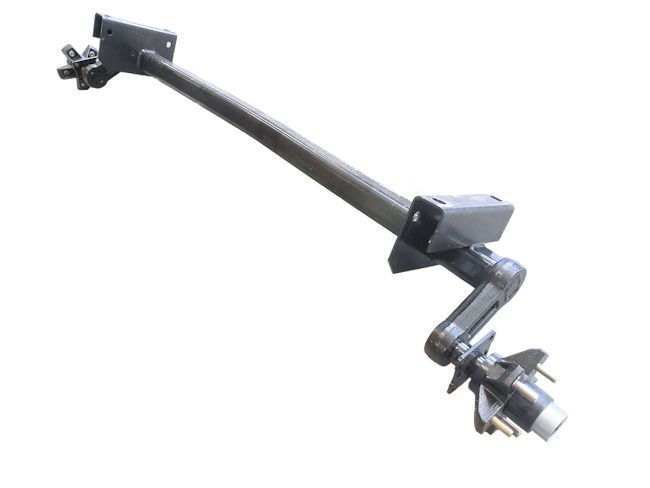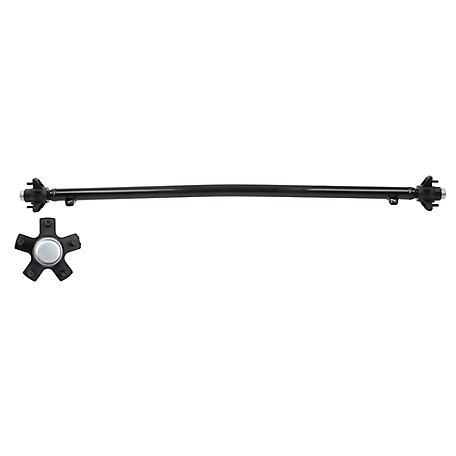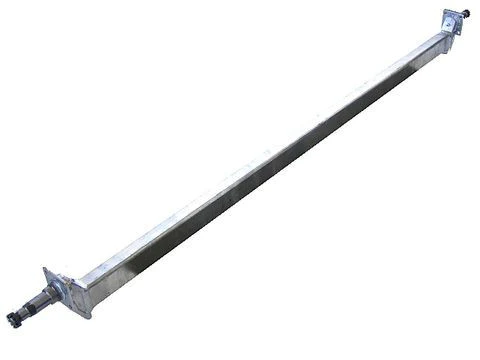Product Description
Product Description
Manufacturer 8t-25t American Inboard Built-in Brake Drum Axle for Trailer truck
| Axle Type | Max Capacity(t) | Track(mm) | Brake(mm) | Spring Seat Installation | Axle Beam(mm) | Centre Distance Of Brake Chamber(mm) | Wheel Fixing | Total Length(mm) | Recommended Wheel | Axle Wright(kg) | ||
| Stud | P.C.D(mm) | H(mm) | ||||||||||
| JS08Y2C15 | 8 | 1850 | 420*150 | ≥1080 | 127 | 428 | 10*M22*1.5 ISO | 335 | 280.8 | ~2145 | 7.5V-20 | 323 |
| JS13Y9C10 | 13 | 1840 | 420*180 | ≥970 | 127 | 380 | 10*M22*1.5 ISO | 335 | 280.8 | ~2180 | 7.5V-20 | 342 |
| JS13F1B10 | 13 | 1840 | 420*180 | ≥930 | 150 | 380 | 10*M22*1.5 ISO | 335 | 280.8 | ~2180 | 7.5V-20 | 340 |
| JS14F1B11 | 14 | 1840 | 420*220 | ≥930 | 150 | 340 | 10*M22*1.5 ISO | 335 | 280.8 | ~2180 | 7.5V-20 | 358 |
| JS15F6B11 | 15 | 1850 | 420*180 | ≥940 | 150 | 390 | 10*M22*1.5 ISO | 335 | 280.8 | ~2200 | 8.0V-20 | 370 |
| JS16F6B11 | 16 | 1850 | 420*220 | ≥940 | 150 | 350 | 10*M22*1.5 ISO | 335 | 280.8 | ~2200 | 8.0V-20 | 388 |
| JS20F8B12 | 20 | 1850 | 420*220 | ≥940 | 150 | 345 | 10*M24*1.5 ISO | 335 | 280.8 | ~2247 | 8.0V-20 | 430 |
| JS25H8B12 | 25 | 1850 | 420*220 | ≥940 | 150 | 340 | 10*M24*1.5 ISO | 335 | 280.8 | ~2215 | 8.0V-20 | 474 |
Company Profile
ZheJiang CZPT Axle Manufacturing Co., Ltd., founded in 2000, with more than 300 skilled employees and professional designers for different areas. We adopt the domestic and international technical standards in production, accurately grasp the information of the market demand and make quick and optimal designs. In this way, our axle, suspension and other fittings have the world-class technical quality through reasonable and advanced manufacture technologies. Our advanced processing technology, first-class production line and precision CNC machining equipment from home and abroad ensure the good quality of our semi-trailer axle assemblies, suspension systems and other correlative fittings. At the same time, our annual capacity for the export of American and German semi-trailer axle assemblies has achieved 60, 000 pieces and of suspension assemblies has achieved 50, 000 sets. We obtained the ISO9001: 2000 International Quality Management System Certification in 2003 and TS16949 Certification in 2007.
Certifications
Packaging & Shipping
FAQ
1. What’s your advantage?
First we are manufacturer, we own professinal technology & quality control team; excellent team for foreign trade plus a rich expertise in trading.
2. What kinds of mainly products do you manufacture?
We are a professional manufacturer of trailer axle assemblies, semi-trailer suspension systems and correlative fittings in China.
3. Can you send me samples for testing?
Certainly! We’d like to provide the samples free of charge, but for the freight, pls kindly bear it.
4. How long do you finish a mew product?
Usually 20~35days once all information confirmed
| After-sales Service: | 24 Hours Online |
|---|---|
| Condition: | New |
| Axle Number: | 2 |
| Application: | Truck/Trailer |
| Certification: | CE, ISO |
| Material: | Steel |
| Samples: |
US$ 500/Piece
1 Piece(Min.Order) | |
|---|
| Customization: |
Available
| Customized Request |
|---|

How do trailer axles enhance the overall towing experience and safety?
Trailer axles play a significant role in enhancing the towing experience and safety in several ways:
- Load Distribution: Axles are strategically positioned to distribute the trailer’s load evenly. Proper load distribution prevents swaying, fishtailing, or trailer instability, ensuring a safer towing experience.
- Weight-Bearing Capacity: The load-bearing capacity of trailer axles is designed to handle specific weight limits. This capacity is crucial for safe towing, preventing overloading that can lead to accidents.
- Control and Stability: Axles with adequate weight capacity and the right placement contribute to better control and stability. They minimize the risk of losing control of the trailer, especially during sudden stops or maneuvers.
- Braking Systems: Many trailer axles are equipped with integrated brake systems or are compatible with trailer brakes. Braking systems enhance safety by allowing the driver to control the trailer’s speed and reduce braking distance.
- Suspension: Trailer axles often feature suspension components that absorb shocks and vibrations, improving the ride quality and overall control. This minimizes the risk of cargo shifting during transit.
- Maneuverability: Properly configured axles improve a trailer’s maneuverability, making it easier to navigate tight corners, reverse, and park. This is especially important for drivers when towing in crowded or confined spaces.
- Adaptability: Different axle types are designed for specific applications, whether for standard road use, off-road adventures, or marine environments. Using the right axles for the intended purpose enhances safety and performance.
- Corrosion Resistance: Trailers equipped with axles made from corrosion-resistant materials, such as galvanized or aluminum axles, are better suited for marine and coastal regions. They maintain their structural integrity and safety features even in corrosive environments.
- Load Balance: The axles’ load-balancing capabilities contribute to better trailer balance. Proper balance prevents overloading on one side and minimizes the risk of rollovers or accidents.
- Compliance with Regulations: Trailer axles must meet legal weight limits and safety standards. Ensuring compliance with these regulations is essential for safe and legal towing.
In summary, trailer axles are integral to a safe and enjoyable towing experience. They support load distribution, stability, control, and various safety features that prevent accidents and mishaps during towing.

What are the key considerations when selecting the right trailer axle for a specific application?
Choosing the appropriate trailer axle for a specific application involves several critical considerations:
- Weight Capacity: Determine the maximum weight the axle will need to support. This includes the trailer’s payload and the weight of the trailer itself. Ensure the selected axle has a weight capacity that exceeds the application’s requirements to provide a safety margin.
- Axle Type: Select the axle type based on the application. Common types include straight axles, drop axles, and torsion axles. The choice depends on factors like ground clearance, load height, and suspension design.
- Axle Configuration: Decide on the number of axles needed. Single axles are suitable for lighter loads, while tandem and tri-axle configurations offer higher weight capacities. Multi-axle setups provide better weight distribution.
- Suspension Type: Choose the appropriate suspension system, such as leaf spring, air ride, or torsion suspension. The suspension affects ride quality, load stability, and maintenance requirements.
- Brake System: Consider the braking requirements. Larger and heavier trailers often require electric or hydraulic brakes. Ensure the axle accommodates the necessary brake system, including the brake size and type.
- Axle Material: Select the axle material, typically steel or aluminum. Steel axles are durable and cost-effective, while aluminum axles are lighter and corrosion-resistant. The choice depends on the application’s demands and budget.
- Hub and Spindle Type: Choose hubs and spindles compatible with the axle. The hub style affects the type of wheel and tire you can use, while spindle size impacts weight capacity and bearing compatibility.
- Wheel Bolt Pattern: Ensure the axle’s hub and wheel bolt patterns match to avoid compatibility issues with the wheels and tires you plan to use.
- Ground Clearance: Consider the required ground clearance for the application. Lower ground clearance may be suitable for highway travel, while off-road or specialty trailers may need increased clearance.
- Legal Compliance: Ensure that the selected axle and trailer configuration comply with local and national regulations regarding weight limits, axle spacing, and safety requirements.
- Manufacturer and Warranty: Choose a reputable axle manufacturer with a track record for quality and durability. Check the warranty and support offered by the manufacturer.
- Budget: Evaluate the budget constraints for the axle and select an option that balances cost-effectiveness with meeting the application’s needs.
By carefully considering these factors, you can select the right trailer axle that ensures safe and efficient performance for your specific application.

Are there different weight capacities for trailer axles depending on the trailer type?
Yes, trailer axles come in various weight capacities, and the capacity depends on the specific trailer type and its intended use. Here are some common weight capacities for different trailer types:
1. Utility Trailers:
– Utility trailers often have single axles with weight capacities ranging from 1,000 to 3,500 pounds. These trailers are used for light-duty hauling and general-purpose applications.
2. Boat Trailers:
– Boat trailers can vary widely in weight capacity based on the size of the boat they are designed to carry. Smaller boat trailers may have weight capacities of 3,000 to 5,000 pounds, while larger ones can exceed 10,000 pounds.
3. Enclosed Trailers:
– Enclosed trailers, used for transporting cargo, merchandise, or personal items, can have weight capacities from 2,000 to 12,000 pounds or more, depending on their size and construction.
4. Flatbed Trailers:
– Flatbed trailers are available in various weight capacities to accommodate different cargo loads. Common capacities include 7,000, 10,000, and 14,000 pounds, among others.
5. Dump Trailers:
– Dump trailers, designed for hauling materials like gravel or construction debris, may have weight capacities ranging from 5,000 to 20,000 pounds, or even higher for heavy-duty models.
6. Car Hauler Trailers:
– Car hauler trailers, used to transport vehicles, typically have weight capacities of 7,000 to 14,000 pounds, depending on the number of axles and the size of the trailer.
7. Gooseneck Trailers:
– Gooseneck trailers are heavy-duty and often used for transporting large equipment or livestock. Their weight capacities can range from 10,000 to 30,000 pounds or more.
8. Specialty Trailers:
– Specialty trailers, such as equipment trailers, horse trailers, and concession trailers, have weight capacities tailored to their specific purposes and design.
– It’s crucial to select a trailer with an axle and weight capacity that matches the intended load. Overloading a trailer can lead to safety risks, damage to the trailer, and legal issues. Manufacturers provide weight ratings and guidelines for each trailer type to help buyers choose the right option for their needs.


editor by CX 2023-11-06